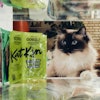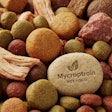
Our microbiome is the collection of bacteria that humans and animals alike carry around with them everywhere. This collection of bacteria inhabits our skin and our digestive system and there are more bacterial cells in our microbiome than there are cells in our body.
What does the research say?
We each have a unique microbiome that plays an important role in our lives that research is only starting to understand. This research is pointing to using the gut microbiome in new sustainable, natural ways that can keep our pets healthy and happy. Often, these approaches are centered around influencing the digestive tract microbiome by the selection of foods and functional ingredients used in the diet, and the research is demonstrating some very interesting findings.
Microbiome studies are highlighting new information around general diet choices like raw diets or grain-free diets, about the ability of new functional ingredients to positively impact the digestive microbiome and about the ways that microbiome changes can impact the overall health and wellbeing of pets. These results bring into sharp focus the need to approach pet nutrition in a new way and the opportunities for those that take a microbiome-considerate approach.
Research into the gut microbiome is beginning to give us new insights into many issues that our pets commonly suffer from and new insights into how we can positively impact those same problems by feeding the gut microbiome differently. Diabetes and obesity are now showing links to specific microbiome patterns in the digestive tract of dogs and humans that are independent from genetic factors in the dog and independent from calorie intake. Additional research is showing that by changing these microbiome patterns we can begin to change the severity of these issues.
Other studies have linked issues like anxiety, food allergies and inflammation to different microbiome patterns in the digestive tract independent of any other factor. Most importantly, we can begin to affect these microbiome patterns through the types of diets we feed and the selection of functional ingredients like specific fibers, targeted ingredients and specialized bacteria. Research in pet nutrition is already keenly focused on new discoveries in this area and will no doubt bring new benefits to a microbiome-centered feeding approach.
The considerations of a microbiome-inclusive diet
We have more options for the types of diets we offer our pets than ever before, with choices like traditionally extruded pet foods, raw pet foods and all-meat diets. Raw diets have gained in popularity as there is a feeling that they are closer to a “natural” diet. Research evidence shows that feeding a raw diet to dogs when compared to an extruded diet can significantly enhance the metabolic and bacterial markers associated with good microbiome health, leading to better overall health for our dogs.
However, to take advantage of the benefits of a raw diet we can’t ignore their potential downsides, namely unsafe bacteria contamination and improper formulation. Choosing an all-meat diet for dogs has important microbiome consequences as well, as research studies have pointed out that all-meat diets can push the gut microbiome into a state of dysbiosis. Some researchers suggest that this may be due to a lack of functional plant fibers in the diet that can help to fuel positive bacteria in the gut. Whatever the choice of feeding, we have much to learn about how that choice feeds and changes the gut microbiome.
Finally, we can impact the gut microbiome directly by the types of nutrients and specialized ingredients we feed our pets, and the progress we have made to date is pointing to a very promising future. At a recent microbiome conference, one pet food company presented extensive research demonstrating the impact of feeding specialized functional fibers on dogs with acute IBD symptoms. By feeding a specialized blend of functional fibers in the diet, the researchers were able to stop the symptoms and support a return to a normal gut microbiome.
We are beginning to see a new generation of specialized bacteria reach the market with a variety of new benefits. Of interest are those that can influence the “gut-brain axis” by modifying specific gut microbiome patterns that in turn influence stress behavior in the dog. These new products are just the tip of the iceberg if current approaches in human research are any indication.
The future of microbiome studies
Studying the microbiome is a very fast-moving field with new and exciting information coming out every day. As consumers we are already getting a lot of messages about the benefits of looking at our microbiome health, and our pets should be no different. This focus is creating interesting opportunities in pet health and nutrition; opportunities both for new ways to keep our companions happy and healthy, and for products and technologies in pet foods. Those that take a microbiome-centric viewpoint will have interesting times ahead!
Dr. Scott Carter is an animal health and nutrition expert with over 20 years of experience in the marketing and research and development of new nutritional health technologies for livestock and companion animals. He is passionate about the opportunities that the microbiome presents for new health strategies in all animals. You may connect with Dr. Carter via Linkedin at www.linkedin.com/in/scottdcarter.

















